Stan Store vs Shopify two platforms, one decision that could make or break your online business.
On one side, you’ve got Stan Store the rising star designed specifically for creators, influencers, and solopreneurs who want to sell digital products, coaching sessions, or affiliate offers without the tech headache.
On the other, there’s Shopify the eCommerce giant trusted by millions, known for its power, flexibility, and massive app ecosystem.
Both let you sell online. Both can help you make money.
But here’s the catch: they’re built for completely different types of sellers and choosing the wrong one could mean wasted time, higher fees, or features you’ll never use.
So… which one wins?
That’s what we’re about to find out.
Key Takeaways
- Why Stan Store and Shopify aren’t interchangeable and how their goals shape everything they offer
- What kind of seller each platform is really built for (no guessing, just facts)
- The difference between launching in 15 minutes vs. building a full-on eCom engine
- How pricing structures can help or quietly hurt your bottom line
- What limitations you’ll run into depending on what you’re trying to sell
- Which platform gives you the most freedom and which one keeps things tight and simple
- And most importantly, how to choose based on your business, not just popular opinion
Disclaimer: I am an independent Affiliate. The opinions expressed here are my own and are not official statements. If you follow a link and make a purchase, I may earn a commission.
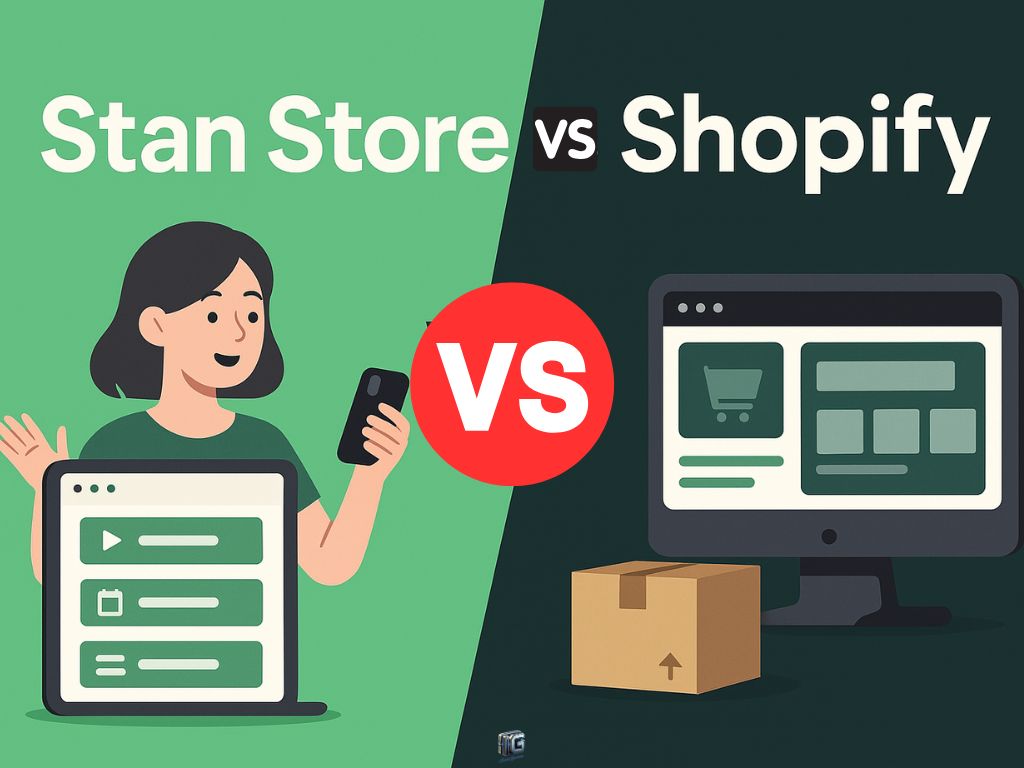
Platform Overview: What Do Stan Store and Shopify Do?
At a glance, both Stan Store and Shopify are platforms designed to help you sell online—but their core philosophies and use cases couldn’t be more different.
Let’s break it down:
What is Stan Store?
Stan Store is a streamlined digital storefront designed with creators, coaches, and solopreneurs in mind. It allows you to sell digital products, offer 1:1 coaching sessions, embed affiliate links, and even manage bookings all in one place.
Think of it like a “Link in Bio” tool with superpowers: you connect it to your Instagram, TikTok, or YouTube, and in minutes you’ve got a clean, mobile-friendly storefront that’s ready to make you money.
There’s no complicated backend, no plugin drama, and no coding. Just upload your offer, set a price, and you’re good to go.
What is Shopify?
Shopify is one of the world’s leading eCommerce platforms, powering over 4 million businesses globally. It’s a full-fledged website builder and online store solution designed for scaling.
Whether you’re selling physical goods, digital products, dropshipping, or subscriptions, Shopify can handle it. You get a custom domain, extensive design control, thousands of apps, built-in payment processing, and the ability to manage inventory, track orders, and run marketing campaigns.
In short: Shopify is like a digital warehouse with a storefront built for brands that need infrastructure, not just simplicity.
Here’s how they compare right out of the gate
| Category | Stan Store | Shopify |
|---|---|---|
| Purpose | Designed for creators to sell digital products, coaching, and affiliate offers | Built for businesses to sell physical & digital products at scale |
| User Type | Influencers, coaches, solopreneurs | eCommerce brands, startups, multi-product businesses |
| Structure | Link-in-bio style storefront | Full website and store builder with custom domain |
| Setup Time | Minutes upload your product, set a price, done | Hours (or days) themes, apps, product pages, integrations |
| Complexity | Very low no code, no plugins | Medium to high depends on features and customizations |
| Main Strength | Selling fast with zero friction | Building a scalable, branded store with advanced features |
Verdict so far?
- Stan Store is for creators who want to launch quickly and monetize directly from social media.
- Shopify is for businesses that need full control, robust infrastructure, and room to scale.
From here on out, we’ll dig deeper into exactly who each platform serves best and where one might fit you better than the other.
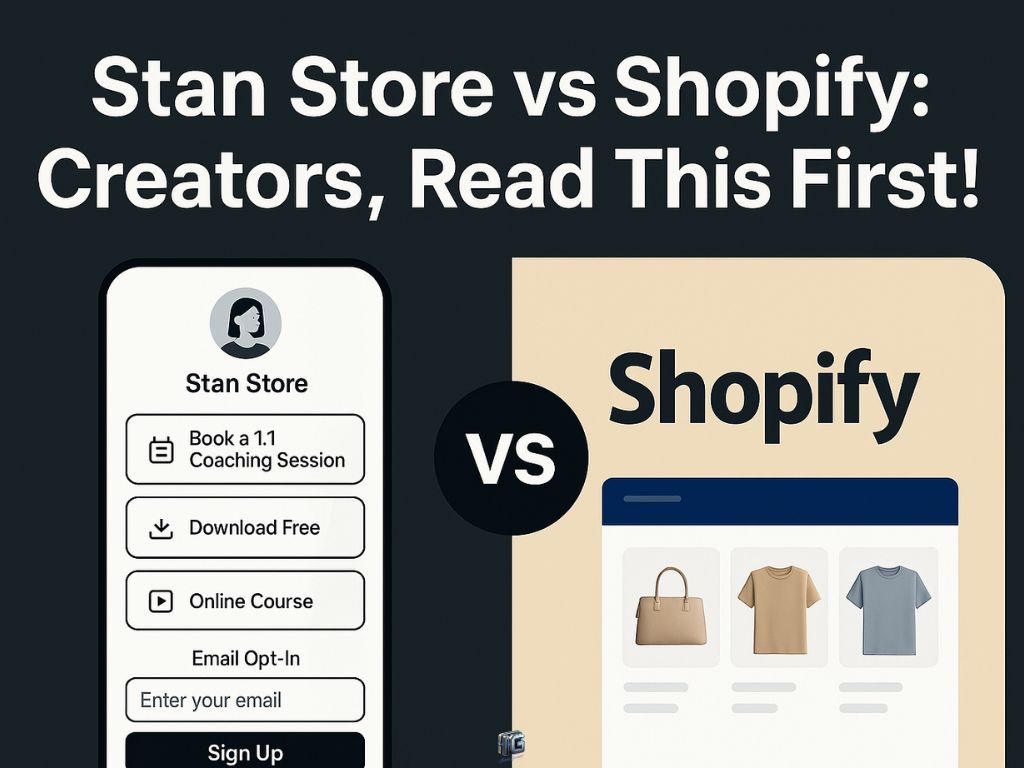
Stan Store vs Shopify: Who Each Platform Is Best For
When it comes to choosing between Stan Store vs Shopify, one of the biggest mistakes you can make is picking a platform based on features without first asking who it’s actually built for.
These two tools serve very different types of sellers, and the one that works for someone else could completely stall your progress if it’s not aligned with your business model.
Let’s break it down:
Stan Store is best for:
- Creators and influencers who monetize primarily through social platforms
- Coaches and consultants offering 1:1 calls or digital services
- Affiliate marketers who need a simple storefront to showcase offers
- People selling digital products like eBooks, templates, PDFs, and courses
- Anyone who wants to start selling within minutes, without learning web design or installing plugins
If your brand lives on Instagram, TikTok, YouTube, or Twitter and you just need a clean, clickable place to send your followers Stan Store is tailor-made for you.
Shopify is best for:
- eCommerce entrepreneurs building product-based businesses
- Brands selling physical goods, subscriptions, or multi-SKU inventory
- Businesses that need custom branding, advanced apps, and integrations
- Sellers planning to scale with SEO, email marketing, and upsells
- Anyone comfortable investing more time and money into building a full store
If you’re treating your store like a business complete with marketing campaigns, branding, shipping logistics, and long-term goals Shopify is the better fit.
Still Not Sure?
Ask yourself this:
- Do you want to sell a few digital offers from your bio? → Stan Store
- Or are you building a full online store and brand? → Shopify
Simple as that.
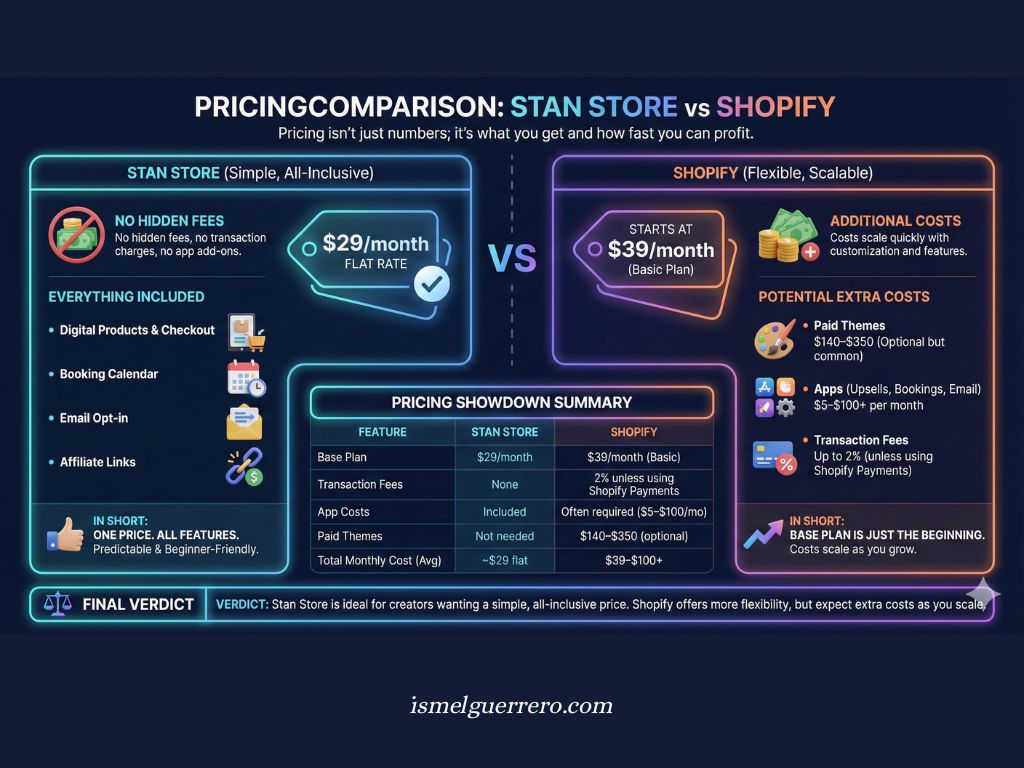
Pricing Comparison: Stan Store vs Shopify
Pricing can be sneaky especially when one platform looks cheaper upfront but piles on costs later. So let’s break it down: Stan Store vs Shopify pricing isn’t just about numbers, it’s about what you get and how fast you can profit.
Stan Store Pricing
- Flat rate: $29/month
- No hidden fees, no transaction charges, no app add-ons
- Everything included: digital products, booking calendar, email opt-in, affiliate links, checkout
In short: One price. All features. Predictable and beginner-friendly.
Shopify Pricing
- Starts at $39/month for the Basic plan
Additional costs:
- Paid themes: $140–$350 (optional but common)
- Apps for upsells, bookings, email tools: $5–$100+ per month
- Transaction fees: Up to 2% unless using Shopify Payments
In short: The monthly plan is just the beginning costs scale quickly depending on how customized and feature-rich your store becomes.
Pricing Showdown Summary
| Feature | Stan Store | Shopify |
|---|---|---|
| Base Plan | $29/month | $39/month (Basic) |
| Transaction Fees | None | 2% unless using Shopify Payments |
| App Costs | Included | Often required ($5–$100/mo) |
| Paid Themes | Not needed | $140–$350 (optional) |
| Total Monthly Cost (Avg) | ~$29 flat | $39–$100+ |
Verdict: Stan Store is ideal for creators who want a simple, all-inclusive price. Shopify offers more flexibility but expect extra costs as you scale.
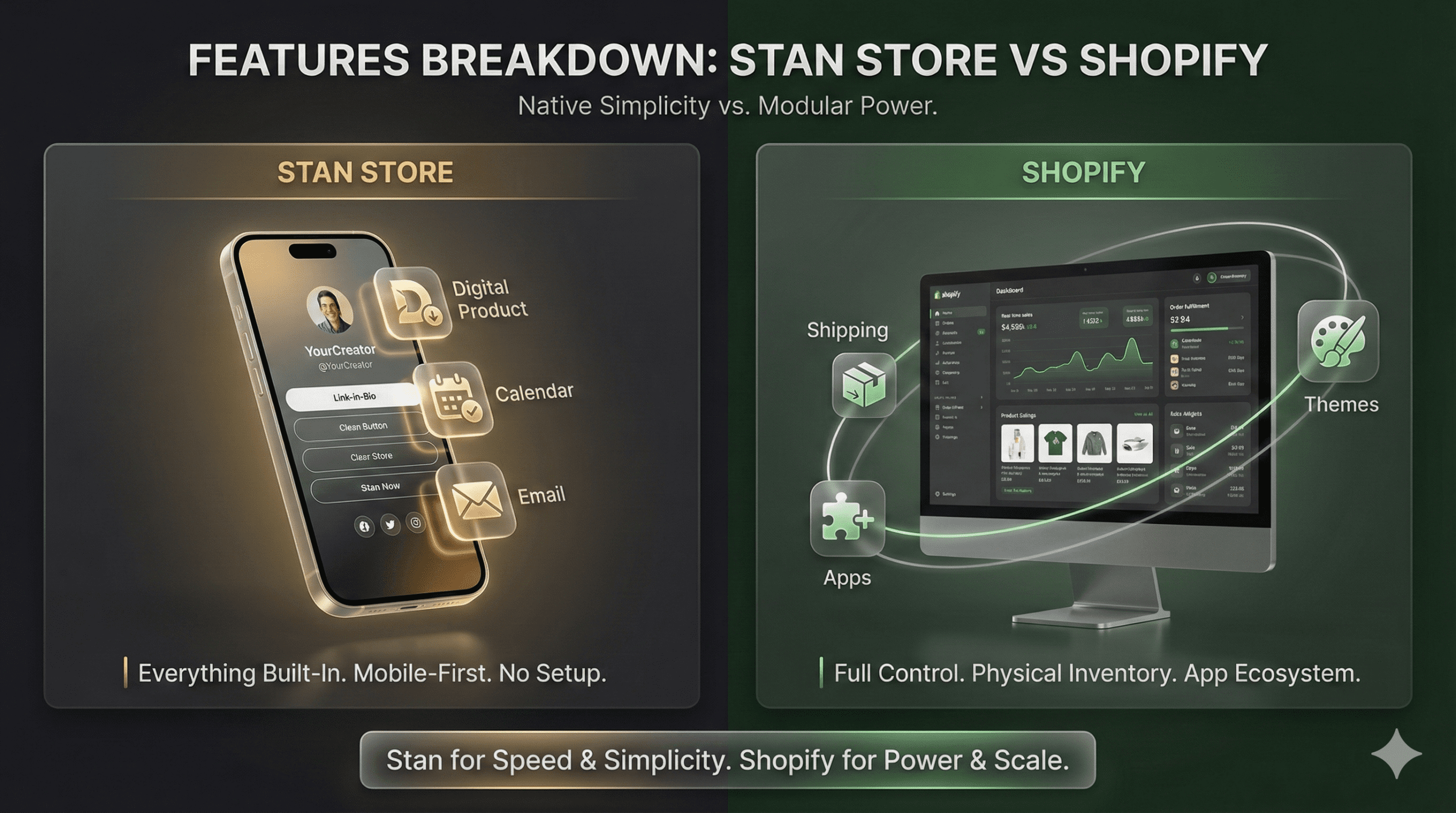
Features Breakdown: Stan Store vs Shopify
When comparing Stan Store vs Shopify, pricing tells you what you’re spending but features tell you what you’re really getting for it.
Let’s stack them side-by-side and see how they deliver on what matters to online sellers.
Core Features Comparison
| Feature | Stan Store | Shopify |
|---|---|---|
| Digital Product Hosting | ✅ Built-in, no setup needed | ✅ Supported, but setup is more involved |
| Physical Product Sales | ❌ Not supported | ✅ Full inventory & shipping tools |
| Affiliate Link Support | ✅ Native support | ❌ Requires workarounds or third-party apps |
| Email Collection | ✅ Built-in lead capture forms | 🟡 Needs app integration |
| 1:1 Booking Calendar | ✅ Built-in scheduling tool | ❌ Only possible with apps |
| Course or Coaching Offers | ✅ Native support | 🟡 Requires apps like Thinkific or integrations |
| Custom Domain | ❌ Uses stan.store/yourname (no custom domains yet) | ✅ Full domain & DNS control |
| Themes & Design | ❌ One clean template | ✅ Wide selection of themes, customizable |
| App Ecosystem | ❌ No app store (everything is native) | ✅ Massive app store with thousands of options |
| Mobile-First Experience | ✅ Optimized for link-in-bio and mobile checkout | ✅ Responsive, but not “link-in-bio” optimized by default |
Key Differences
- Stan Store keeps it lean and focused. Everything you need is already built in, but you can’t expand much beyond its template.
- Shopify offers full customization and extendability, but you’ll need to build out your ideal setup using apps, themes, and possibly custom code.
What Does That Mean for You?
- If you want everything in one place and working out of the box, Stan Store is your tool.
- If you need total control and room to build complex systems, Shopify is unmatched but you’ll work harder for it.
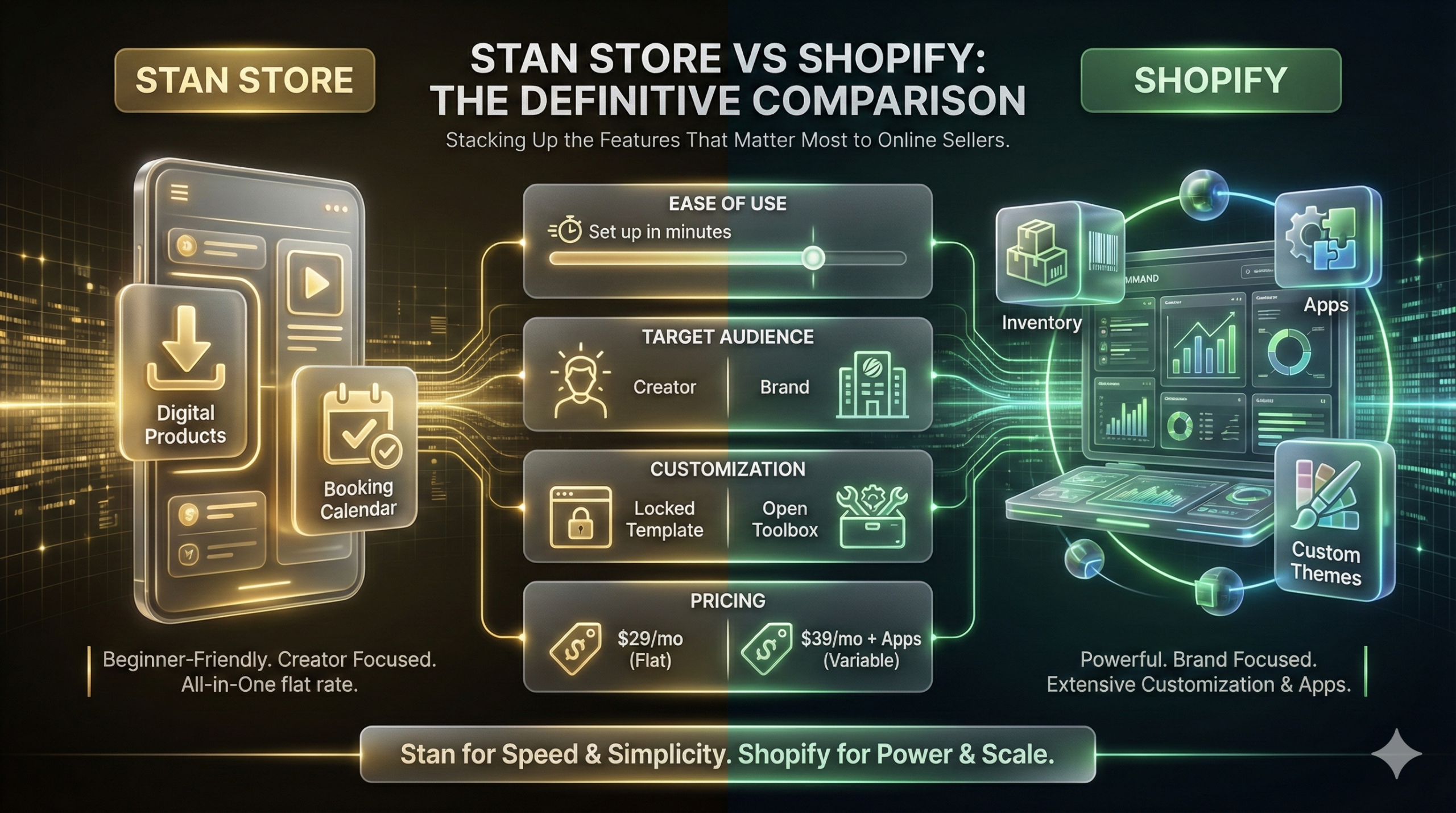
Stan Store vs Shopify – Comparison
To make the choice easier, here’s a breakdown of how Stan Store and Shopify stack up in the areas that matter most to online sellers:
| Feature | Stan Store | Shopify |
|---|---|---|
| Ease of Use | Extremely beginner-friendly. Set up in minutes with no tech skills needed. | Steeper learning curve. More powerful, but requires more setup time. |
| Target Audience | Content creators, digital product sellers, coaches, influencers | eCommerce brands, physical product sellers, dropshippers |
| Product Types | Digital products, coaching calls, affiliate links | Physical and digital products, subscriptions, memberships, more |
| Customization | Minimal. Clean and simple templates only. | Extensive. Full control with themes, apps, and custom code |
| Built-In Features | Booking calendar, lead capture forms, link-in-bio, upsells, email integration | Inventory management, marketing tools, shipping integrations, SEO tools |
| Affiliate-Friendly? | Yes. Easily integrates affiliate links into your digital storefront | Not native. Requires extra tools or apps for affiliate-style pages |
| Pricing | $29/month (flat rate, all-in-one) | Starts at $39/month (+ paid apps, themes, transaction fees) |
| Design Flexibility | Limited. You get what you get and it works. | Highly flexible with premium themes and customizations |
| Support & Community | Smaller, creator-focused community. Fast support via email | Huge ecosystem, 24/7 support, and tons of third-party tutorials |
| Best For… | Creators looking for a fast, simple way to sell digital products | Businesses needing a full eCommerce store with advanced tools |

Selling Digital vs Physical Products
Not all products are created equal and neither are the platforms that sell them. If you’re selling digital downloads, coaching sessions, or affiliate offers, your needs are wildly different from someone managing a warehouse of physical goods.
Here’s how Stan Store and Shopify handle both sides of the coin:
Stan Store: Digital-First by Design
Stan Store was built with digital in mind, full stop. You can:
- Upload eBooks, templates, and PDFs
- Offer coaching calls with built-in booking tools
- Sell digital courses or access links
- Share affiliate offers as product-style listings
Everything is optimized for a fast, mobile-friendly experience. There’s no inventory management, no shipping, and no complications.
If your entire business lives in the cloud whether that’s content, coaching, or digital products Stan Store is lean, efficient, and made for creators who don’t need anything physical to make a sale.
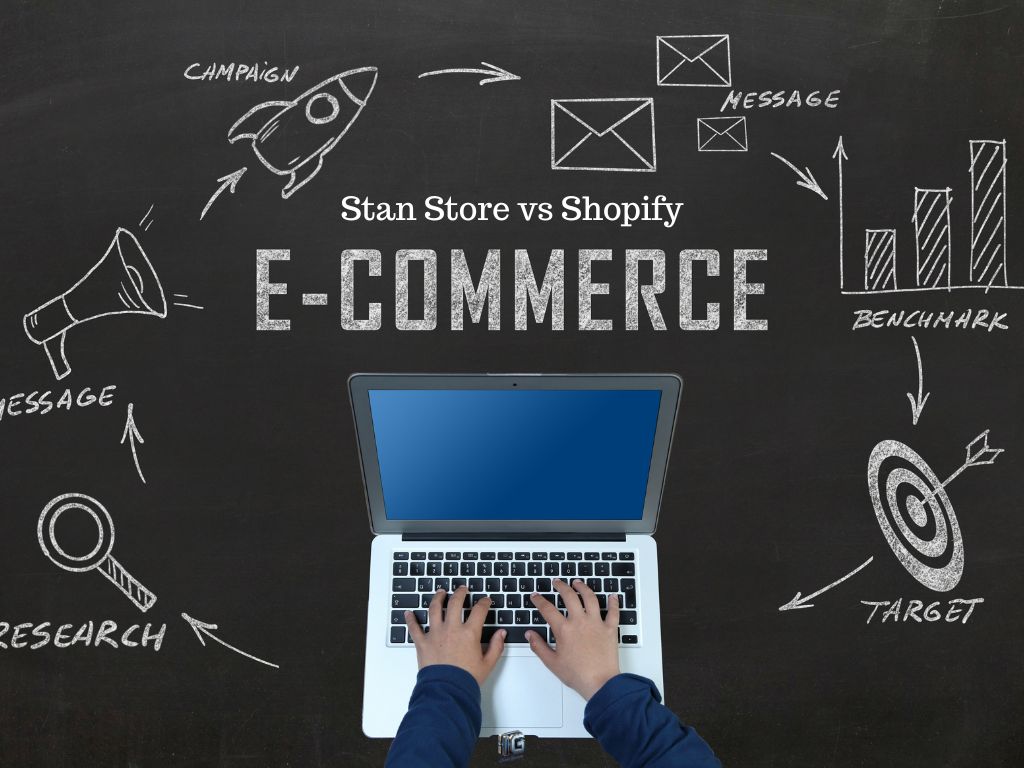
Shopify: Physical Product Powerhouse (with Digital Options)
Shopify’s bread and butter is eCommerce at scale. Physical products are at the core of its ecosystem. You get:
- Inventory management tools
- Shipping integrations and fulfillment apps
- Barcode and SKU tracking
- Sales tax setup by region
It’s ideal for sellers managing tangible products, warehouses, or dropshipping. But Shopify can also handle digital products just not as natively.
To sell digital items, you’ll need to:
- Install an app like Digital Downloads or SendOwl
- Customize delivery and access pages
- Manage digital licensing manually, if needed
It works but it’s not built-in. And it’s nowhere near as fast or frictionless as Stan Store.
Verdict
- Stan Store is the clear winner for selling digital products, coaching, and affiliate offers out of the box.
- Shopify is the heavyweight champ for physical product businesses, with digital as a secondary feature via apps.
What you sell should drive where you sell. This is one of the most important factors in choosing the right platform.
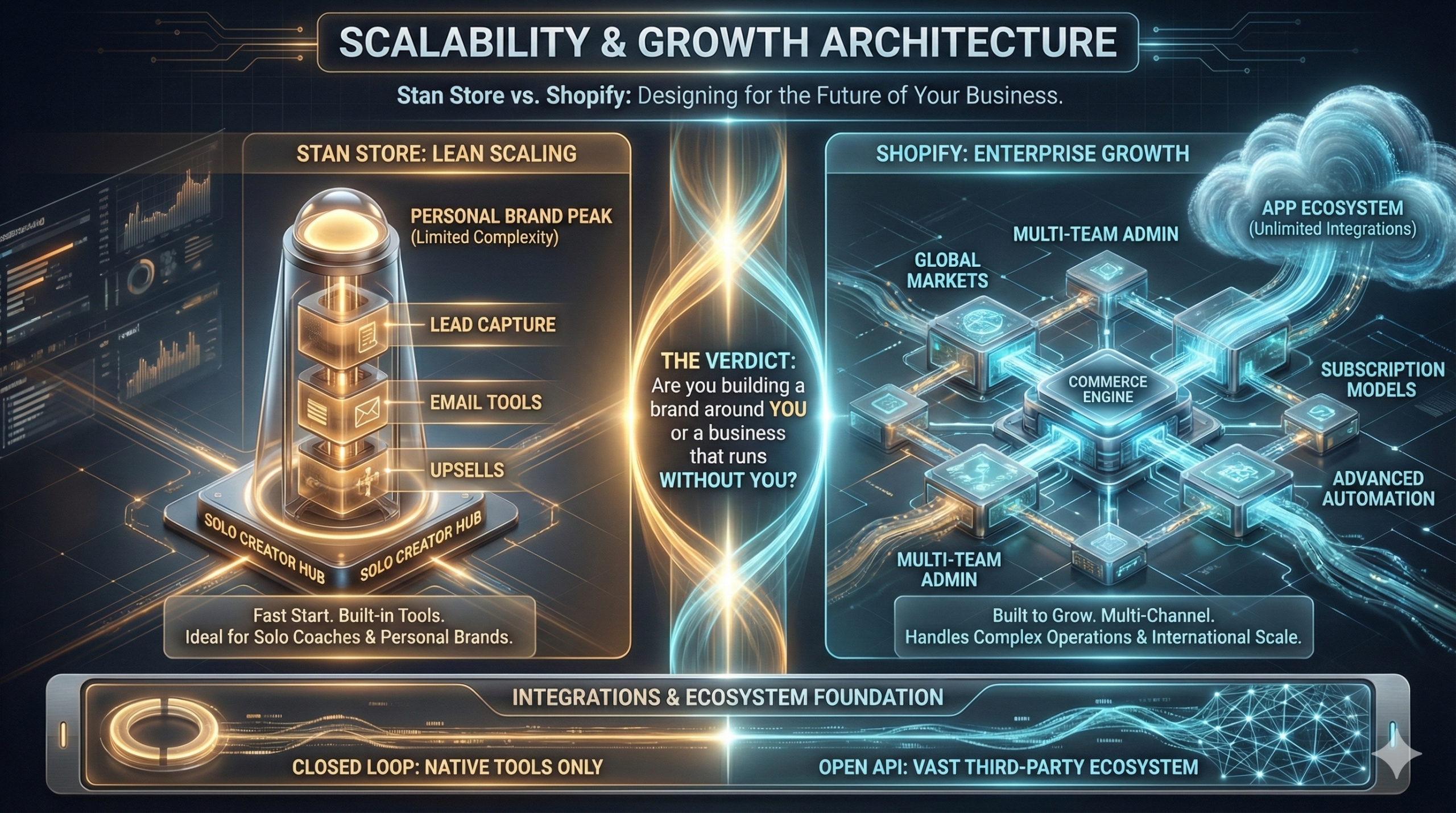
Stan Store vs Shopify: Scalability & Business Growth
Choosing a platform isn’t just about where you start, it’s about how far you can go. Whether you’re aiming to turn your side hustle into a full-time income or scale into a six- or seven-figure business, scalability matters.
So how do Stan Store and Shopify stack up when it’s time to level up?
Stan Store: Fast Start, Lean Scaling
Stan Store shines in simplicity, but that also limits how far you can stretch it.
- Perfect for solo creators managing a handful of offers
- Built-in tools support lead capture, email marketing, and upsells
- Great for scaling personal brands or coaching-based businesses
But here’s the reality: there’s no marketplace, no app store, and limited design control. As your business grows and your needs get more complex, Stan Store might start to feel like training wheels.
It’s excellent for turning attention into income quickly but not ideal if you plan to build a multi-offer, multi-team, automation-heavy online empire.
Shopify: Built to Grow with You
Shopify is built for scale. Whether you’re adding:
- Dozens (or thousands) of products
- Email automation systems
- Subscription models
- Multichannel sales (like Amazon, TikTok, or physical POS)
- Teams, admins, or fulfillment systems
…Shopify can handle it.
It also supports international expansion, detailed analytics, SEO tools, and powerful integrations with CRMs and inventory software.
Yes, it’s more work upfront. But that investment pays off when you’re ready to grow aggressively.
Verdict
- Stan Store helps you scale your personal brand fast, lean, and creator-first.
- Shopify is built to scale your business broad, complex, and enterprise-ready.
Ask yourself: are you building a brand around you or a business that runs without you?
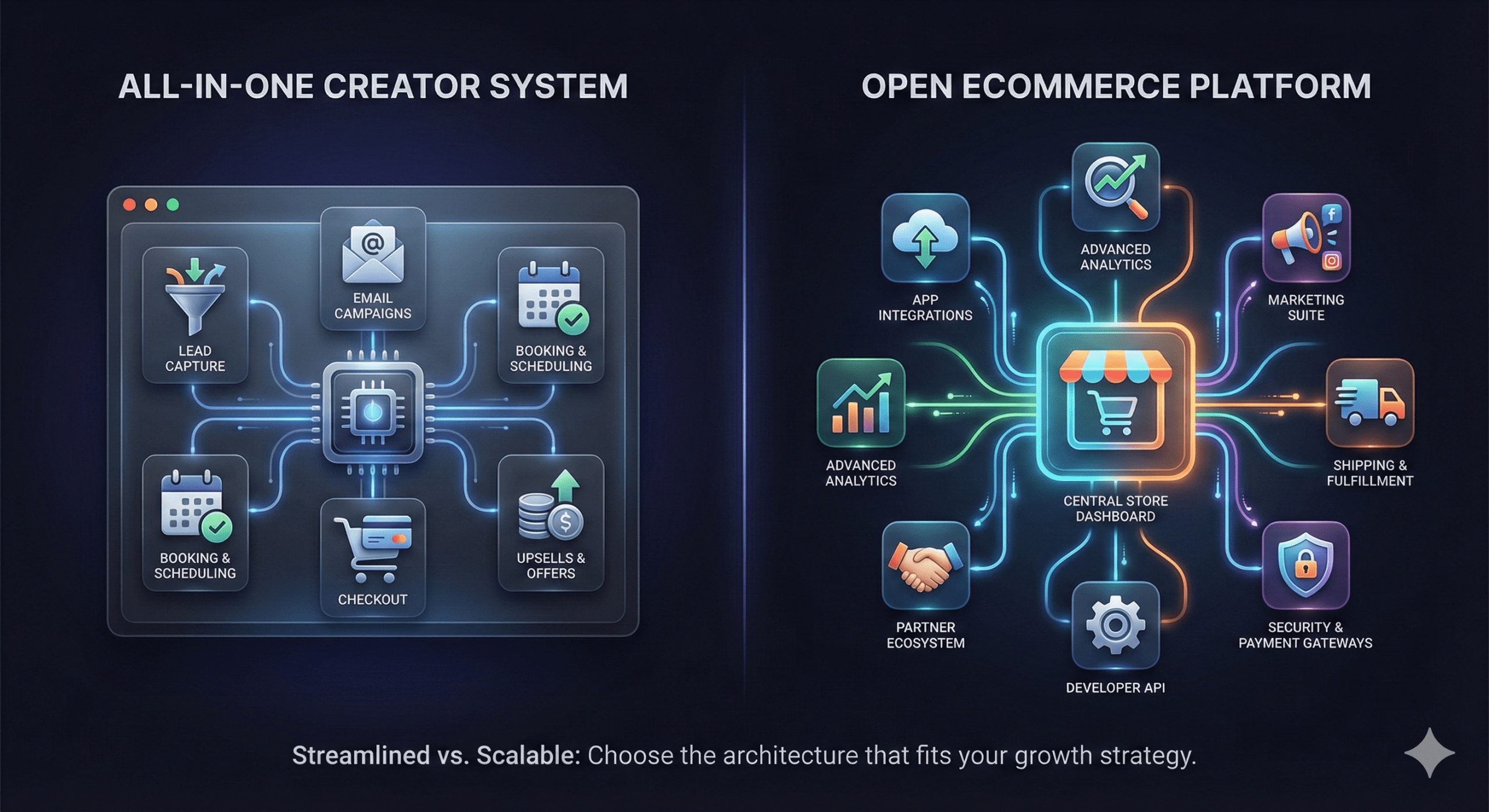
Integrations & Ecosystem
A platform’s true power often lies in its ecosystem how well it plays with other tools, apps, and services you’ll need as your business grows. From email marketing to analytics to shipping logistics, integrations can either make your life easier or turn setup into a struggle.
Stan Store: Everything Built In
Stan Store skips the ecosystem and opts for all-in-one simplicity.
- Lead capture, email automation, booking tools, checkout, and upsells are all native
- No need to install apps or worry about compatibility
- Connects directly to Stripe for payments
The upside? Fewer decisions, no tech headaches, and a faster path to launch.
The downside? No integrations beyond the basics. You can’t plug in your favorite email service provider, CRM, or analytics tools (at least not natively).
If you’re okay with using the tools Stan gives you and you like the idea of not relying on third-party services, it’s a dream. But if you want flexibility, you’ll hit limitations quickly.
Shopify: A Full App Store at Your Fingertips
Shopify has one of the largest app ecosystems in the eCommerce world:
- Thousands of third-party apps for email marketing, fulfillment, analytics, reviews, upsells, loyalty programs, and more
- Native integrations with tools like Klaviyo, Mailchimp, Google, Meta, and TikTok
- API access for custom development and advanced automations
Whatever your workflow or marketing stack looks like, Shopify likely has a solution or three.
This flexibility is a big part of why businesses that start on Shopify often stay on Shopify.
Verdict
- Stan Store keeps it clean and simple ideal for solo creators who want built-in everything.
- Shopify is for those who want to connect, expand, and scale with tools that grow alongside their business.
Stan Store vs Shopify: Pros and Cons
| Platform | Pros | Cons |
|---|---|---|
| 🟢 Stan Store |
|
|
| 🟠 Shopify |
|
|
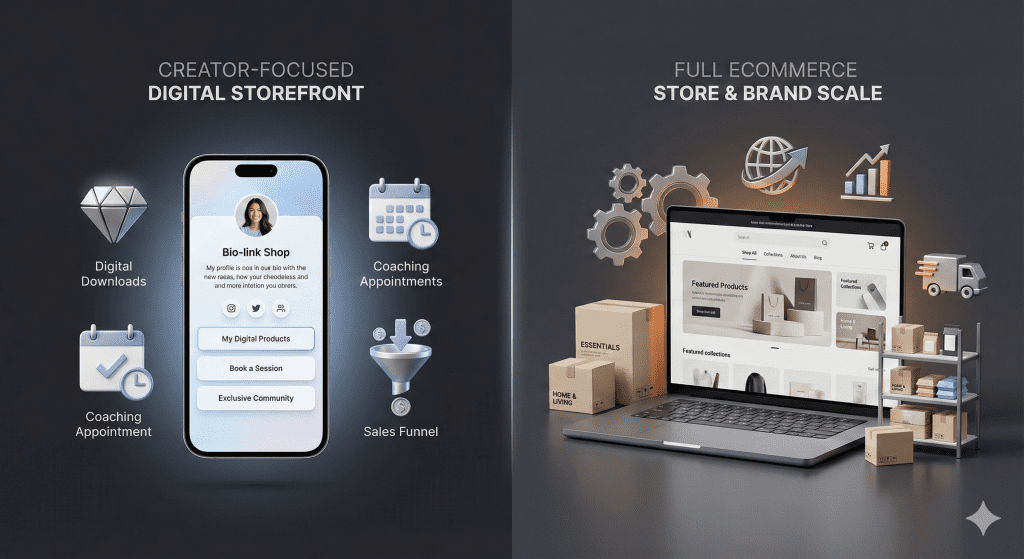
Stan Store vs Shopify: Which One Should You Choose?
So… Stan Store vs Shopify who wins?
Well, that depends on you.
Here’s the real talk:
Choose Stan Store if…
You’re a content creator, coach, affiliate marketer, or solopreneur who wants to:
- Sell digital products, coaching sessions, or eBooks without touching code
- Build a simple funnel straight from your Instagram, TikTok, or YouTube bio
- Start earning fast without tech headaches or dozens of plugins
- Want an affordable, all-in-one storefront made for creators
Basically, if you’re building a personal brand and just need a clean, effective way to make money online, Stan Store was made with you in mind.
Choose Shopify if…
You’re building a brand-first business or eCommerce store and want to:
- Sell physical products, manage inventory, and customize every detail
- Have access to advanced tools like SEO, abandoned cart recovery, and upsells
- Integrate dozens of apps, customize your theme, and scale as big as you want
- You’re okay with investing more time and money to build a fully branded store
Shopify is for the long game. If you’re thinking big, need more features, and plan to build a store, not just a sales page, it’s the better choice.
Bottom line?
- If you’re a creator, coach, or affiliate marketer, go with Stan Store.
- If you’re launching a full-scale eCommerce brand, go with Shopify.
Next: Check out our Wix vs Etsy guide for a direct look at marketplace speed vs full control.

Conclusion
Choosing between Stan Store and Shopify comes down to one thing: your business model.
If you’re a creator, coach, or affiliate marketer looking to launch fast, sell digital products, and skip the tech overwhelm Stan Store is built for you. It’s a clean, simple, all-in-one solution that gets out of your way so you can focus on creating and earning.
If you’re building a full-fledged eCommerce brand, need physical product support, or want to scale with advanced tools and integrations Shopify is the clear winner. It’s more complex, but it offers unmatched flexibility and room for growth.
Both platforms are powerful but in different ways. Choose the one that aligns with where you are now, and where you’re headed next.
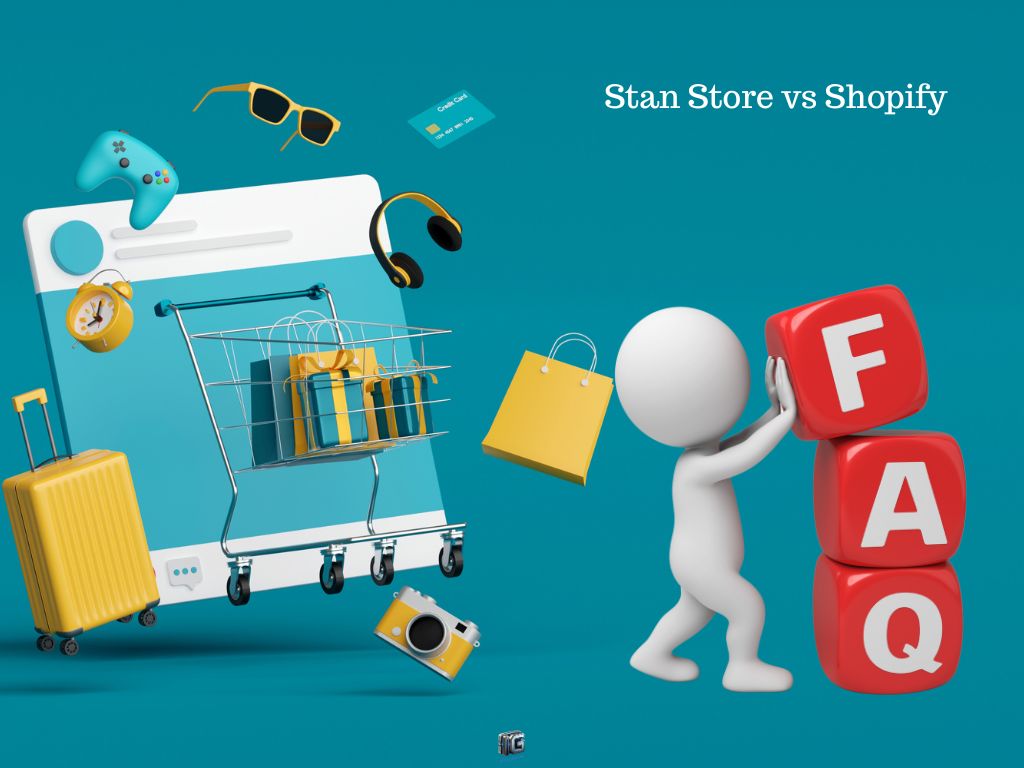
Frequently Asked Questions (FAQs)
Is Stan Store better than Shopify?
Not necessarily just different. Stan Store is better for creators selling digital products quickly with minimal setup. Shopify is better for businesses needing full eCommerce capabilities and scalability.
Can I sell physical products on Stan Store?
No. Stan Store is designed strictly for digital products, coaching sessions, and affiliate links. If you’re selling anything that requires shipping, Shopify is the better option.
Does Shopify support digital products?
Yes, but not out of the box. You’ll need to install a third-party app like Digital Downloads to deliver your files. It’s doable but not as seamless as Stan Store.
Can I use both platforms together?
You could. Some creators use Stan Store for their personal brand and affiliate offers, while running a Shopify store for physical products. But for most people, one is enough.
Which is more beginner-friendly?
Stan Store, hands down. If you’ve never built an online store before, you’ll have your first offer live on Stan Store within the hour. Shopify has a steeper learning curve but more power.
Do either platforms offer free trials?
Yes. Shopify offers a 3-day free trial with a promotional $1/month option for the first 3 months. Stan Store typically offers a 14-day free trial (confirm current promo on their site).
1 Comment
Wix vs Etsy: Which Platform Makes You More Money in 2025? - Ismel Guerrero. · April 17, 2025 at 10:27 pm
[…] you’re selling digital products or services, there’s another battle worth seeing—Stan Store vs Shopify. Both platforms are built for creators, but take completely different approaches to selling […]